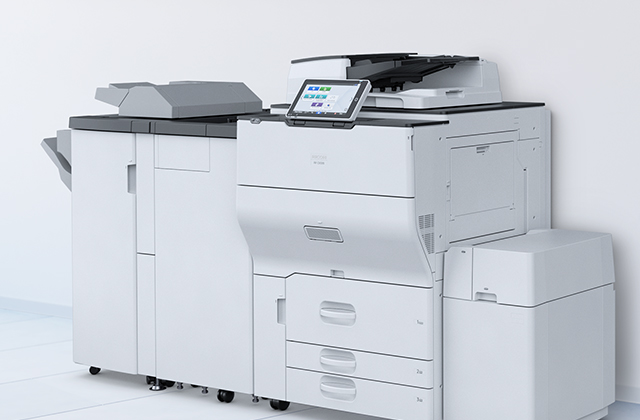Five top priorities for the mid-market, according to you ...
Ricoh Europe, 26 September 2016 – In Formula 1, drivers often receive the most glory and attention when in fact every team member’s contribution counts towards finishing in poll position. Pit stops may only take up mere seconds in a race, yet the pit crew’s contribution can often determine the outcome of a race. Similarly, mid-sized businesses (MSBs) make up only 2% of European businesses, yet they generate over 30% of all revenue in the region. Despite boasting the unofficial accolade of being Europe’s economic engine room, MSBs are often overlooked in comparison to smaller businesses and large enterprises - left suffering from a form of ‘middle child syndrome’.
They are a key creator of economic value and opportunity. But many feel they don’t receive the necessary support to address the challenges common to businesses of their size – neglected in flavour of more glamorous start-ups and corporations.
Two factors in particular stand out: a regulatory burden that falls especially hard on MSBs, and an inability to unlock access to finance so they can invest for the longer-term.
Governments have introduced regulations, grants and schemes to stimulate growth for small businesses, start-ups and entrepreneurs, while large cap firms typically have the resources to withstand certain market forces.
According to the research we have commissioned – a study into the challenges faced by 1,650 mid-sized businesses across Europe – this ‘middle child syndrome’ holds back not only these companies but the wider economic wellbeing of the continent.
However, the good news is that MSBs are full of dynamism and self-confidence. The average growth rate last year of the European MSBs in our survey was 16.5%, with almost one in five growing at over 30% a year. In the context of growth of just 1.8% across the EU in 2015, that’s a sign of extraordinary success.
While MSBs are a diverse bunch, and face unique challenges depending on their industry and market, there are some intrinsic issues that our research has found to affect most businesses. We asked MSBs around Europe to tell us their top priorities for the next two years, and found that five key objectives rose to the top.
1. Launch new products/services
MSBs across Europe are looking to drive growth by expanding their current product and service portfolios through new product development (NPD) initiatives. This is especially evident in fast growth markets like Russia, where 51% of MSBs have identified this as their top priority.
Deploying digital technology has helped 25% of MSBs create new revenue opportunities, while 24% stated that it has helped them improve their market share. Most companies understand that they can find detailed customer insights by using analytics tools to mine data, or that they can supplement their existing portfolios with a digital product to increase uptake or reduce churn. The issue for many MSBs is that they often lack the capital to invest in new tools, or the expertise to source and deploy them efficiently.
2. Manage company growth
Companies in more mature markets like France (34%) and the UK (30%) have identified that their top priority for the next two years will be managing their company’s growth. This is an especially important activity for companies who are transitioning from a small business, and are trying to implement the more formalised structures, governance, processes and even the underlying mind-set necessary to unlock the next level of growth.
Businesses struggling to grow need to adapt their processes to overcome the hurdles they face. Companies looking to grow through M&A activity (22% of those surveyed) must ensure their organisation is prepared to successfully integrate any new resources, while the 38% of firms intending to go public would be looking to shore up inefficiencies before an IPO, so process optimisation could potentially earn them millions.
3. Innovate processes and use of technology to stay ahead of the competition
European MSBs have a clear understanding of the importance of process optimisation, although 23% are experiencing difficulty implementing the formalised processes that will help them scale.
The vast majority (77%) agree that for a MSB to remain competitive it must innovate processes using technology. Unfortunately, 27% of MSBs are struggling to source and fund the right technology to drive growth.
Where it is deployed well, the competitive benefits are clear. 65% of digital adopters say technology has helped them outpace their competitors. Only 8% say they remain behind the competition despite investing in digital.
4. Improve productivity of your employees
The majority of MSBs (65%) struggle to attract top talent, as many key recruits would prefer to work for larger firms. Similarly, 58% believe that they don’t attract talented graduates because they don’t use the latest digital technologies.
For MSBs to attract the best talent, they must offer them the best solutions to do their work and be as productive as possible. They will certainly need to offer technology comparable to the global leaders in their fields.
When we asked MSBs to list the main benefits they had received from digital, improved customer service was the most cited response (chosen by 36% of respondents), followed closely by increased employee productivity (32%).
Companies with the intention to expand into new vertical markets and geographical territories must not only ensure that they have an establish reputation for excellent customer, but that they are viewed as an attractive work destination.
5. Invest in new technology to transform your business
Of the MSBs surveyed, 26% named digital transformation to be one of their main priorities in the next two years. In the same breath, many felt that technology was also one of their top three challenges. Namely the challenge to source and fund the right technology to support growth.
Many of us are familiar with the more consumerised aspects of workplace technology, but the reality is that MSBs typically need a more fundamental layer of technology across their organisations, rather than individual applications or programs to solve specific problems. In some instances they may need to install entire digital communications and collaboration tools across their estates – such as interactive whiteboards and conferencing systems – to capitalise on modern flexible working methods.
More challenging still, they’re probably getting this technology for the first time. That makes the expense bigger and the decision to invest more significant (as well as more nerve-racking).
Knowing where to start with such a purchase is difficult. Key decision-makers who are implementing digital technologies for the first time could struggle to determine what a good price looks like and how to plan for the roll-out. As such, working with a trusted vendor and partner is a must.
The leaders of MSBs have lots on their agendas. Managing today’s growth and investing for the future are key responsibilities. If they are to keep growing and take their company to the next level, they must prioritise technology. It’s this digital impact that can help them identify the right levers to pull and overcome the all too common problems of “middle child syndrome”.
Download our report focused on the challenges facing the mid-market at
www.ricoh-europe.com/thoughtleadership.
| About Ricoh |
Ricoh is empowering digital workplaces using innovative technologies and services that enable individuals to work smarter from anywhere.
With cultivated knowledge and organizational capabilities nurtured over its 85-year history, Ricoh is a leading provider of digital services, information management, and print and imaging solutions designed to support digital transformation and optimize business performance.
Headquartered in Tokyo, Ricoh Group has major operations throughout the world and its products and services now reach customers in approximately 200 countries and regions. In the financial year ended March 2022, Ricoh Group had worldwide sales of 1,758 billion yen (approx. 14.5 billion USD).
For further information, please visit www.ricoh-europe.com
© 2023 RICOH COMPANY, LTD. All rights reserved. All referenced product names are the trademarks of their respective companies.
For further information, please contact:
Ricoh Europe PLC
Charlotte Fernandez
E-mail: media@ricoh-europe.com
Homepage: www.ricoh-europe.com
Join us on Facebook: www.facebook.com/ricoheurope
Follow us on Twitter: www.twitter.com/ricoheurope
Follow us on LinkedIn: http://linkedin.com/company/ricoh-europe
Visit the Ricoh media centre at: www.ricoh-europe.com/press














